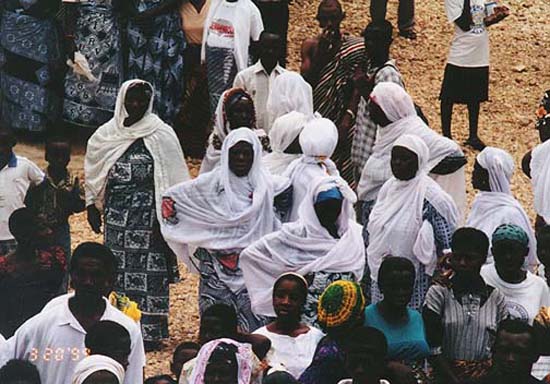
The Carter Centre is tackling Guinea Worm eradication in Ghana through education in collaboration with US Peace Corps volunteers
GHANA-TOGO: Health experts frustrated by Guinea Worm threats
© IRIN
Ghana's Guinea Worm problem affects Togo
ACCRA, 4 Feb 2004 (IRIN) - Northern Ghana was former US President Jimmy Carter's latest port-of-call on Wednesday on a regional tour aimed at highlighting a Guinea Worm eradication programme in West Africa.
Although some some success is being attained in the region, the problems of water supply and regional insecurity continue to scupper health efforts in Ghana.
“Guinea Worm eradication today is one of the most frustrating and challenging interventions within the Health Sector,” Ghana’s Director of Public Health, Dr George Amofah, told IRIN on Wednesday.
Ghana comes second only to war-torn Sudan in the list of countries worst affected by the Guinea Worm- problem. Carter himself has identified Ghana as the country where his own Carter Centre faces it’s biggest challenge, if the disease is to be eradicated entirely.
The former US president has already spent two days in Togo, where Carter reported on his website Monday that “there has been a 58 percent reduction of the disease in the last year".
However, Togo’s success is threatened by Ghana’s continued struggle to tackle the disease.
In 2003, there were 669 cases of Guinea Worm reported in Togo, down from 1626 in 1996. Of these 669 cases, 47 originated in neighbouring Ghana.
Ghana’s Volta Region, which borders Togo, is bearing the brunt of a new outbreak of Guinea Worm in Ghana where about 1,653 new cases of the disease were recorded in 2003.
Health chief George Amofah says that Ghana’s efforts to combat the disease have been hampered by migrations of people from the Dagbon region of northern of Ghana, where inter-ethnic hostilities erupted two years ago.
“Conflict situations simply have to be averted especially when it comes to disease eradication. Disease eradication comes with peace and stability. That is the baseline,” Amofah told IRIN.
The killing of Ghana’s second most powerful regional chief in April 2000 along with 40 of his supporters, displaced thousands. According to Amofah, many fled the Dagbon region for Nkwanta District around 100 km south in the Volta Region where Guinea Worm is now flourishing.
However, Amofah also conceded that in 40 percent of villages where Guinea Worm is still endemic in Ghana, the only source of drinking water is shared with animals. “It is basically a breeding ground for the disease”, he said.
Government efforts to sink boreholes in those areas have failed to bring clean water supplies to villagers.
“In some communities all attempts to get to the water table proved futile. Perhaps we have to concentrate on other ways of getting clean water to these communities instead of still trying to drill boreholes,” Amofah mused.
Guinea Worm is caught from drinking water contaminated with Guinea Worm-larvae. The larvae mature into a worm in the host’s abdomen where it can grow up to three feet long.
After about one year, the worm painfully exits the body, usually though the lower limbs causing swelling and blistering. Sufferers are often unable to walk, go to school or work while the worm exits, which can take as long as two months.
Simple procedures such as straining water through a nylon filter before drinking can strain out the larvae.
The Carter Centre is tackling the disease through education in collaboration with US Peace Corps volunteers. If the eradication programme is successful, Guinea Worm will be the first disease to be wiped out using education alone, that is, without using any vaccine or other treatments.
The Carter Centre aims to eradicate Guinea Worm in Togo by the end of 2004. The government of Japan has donated over US$ 100,000 to the Carter Centre for the programme.
Jimmy Carter and his wife Rosalynn, together with Emory University in the US, founded the Carter Centre in 1982. The Carter Centre works on health, democracy and conflict resolution projects worldwide.
